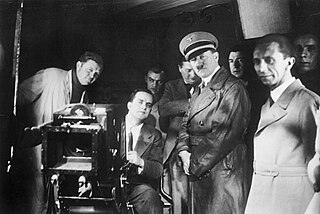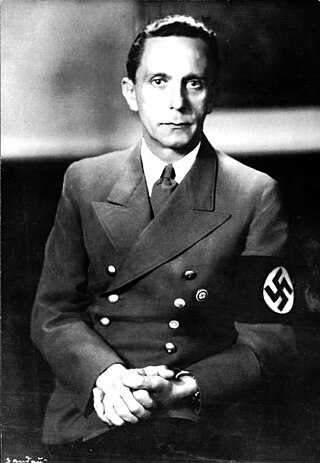Related Research Articles

The film industry in Germany can be traced back to the late 19th century. German cinema made major technical and artistic contributions to early film, broadcasting and television technology. Babelsberg became a household synonym for the early 20th century film industry in Europe, similar to Hollywood later. Early German and German-speaking filmmakers and actors heavily contributed to early Hollywood.

A newsreel is a form of short documentary film, containing news stories and items of topical interest, that was prevalent between the 1910s and the mid 1970s. Typically presented in a cinema, newsreels were a source of current affairs, information, and entertainment for millions of moviegoers. Newsreels were typically exhibited preceding a feature film, but there were also dedicated newsreel theaters in many major cities in the 1930s and ’40s, and some large city cinemas also included a smaller theaterette where newsreels were screened continuously throughout the day.

DEFA was the state-owned film studio of the German Democratic Republic throughout the country's existence.
UFA GmbH, shortened to UFA, is a film and television production company that unites all production activities of the media conglomerate Bertelsmann in Germany. The original UFA was established as Universum-Film Aktiengesellschaft on December 18, 1917, as a direct response to foreign competition in film and propaganda. UFA was founded by a consortium headed by Emil Georg von Stauß, a former Deutsche Bank board member. In March 1927, Alfred Hugenberg, an influential German media entrepreneur and later Minister of the Economy and Minister of Agriculture and Nutrition in Adolf Hitler's cabinet, purchased UFA and transferred ownership of it to the Nazi Party in 1933.
Fremantle Limited, formerly FremantleMedia, is a British multinational television production and distribution company based in London. The company was founded as Pearson Television in 1993 when publishing and education company Pearson acquired the former British ITV franchisee Thames Television. Fremantle takes its name from Fremantle International, which was acquired by predecessor company All American Television in 1994. Pearson Television and Bertelsmann's CLT-UFA merged in 2000 to form the RTL Group, with Pearson Television itself being renamed FremantleMedia on 20 August of the following year.
Wolfgang Preiss was a German theatre, film and television actor.

Nazism made extensive use of the cinema throughout its history. Though it was a relatively new technology, the Nazi Party established a film department soon after it rose to power in Germany. Both Adolf Hitler and his propaganda minister Joseph Goebbels used the many Nazi films to promote the party ideology and show their influence in the burgeoning art form, which was an object of personal fascination for Hitler. The Nazis valued film as a propaganda instrument of enormous power, courting the masses by means of slogans that were aimed directly at the instincts and emotions of the people. The Department of Film also used the economic power of German moviegoers to influence the international film market. This resulted in almost all Hollywood producers censoring films critical of Nazism during the 1930s, as well as showing news shorts produced by the Nazis in American theaters.

Babelsberg Film Studio, located in Potsdam-Babelsberg outside Berlin, Germany, is the second oldest large-scale film studio in the world only preceded by the Danish Nordisk Film, producing films since 1912. With a total area of about 460,000 square metres (5,000,000 sq ft) and a studio area of about 25,000 square metres (270,000 sq ft) it is Europe's largest film studio.
Bavaria Film is a German film production and distribution company that is located in Grünwald, Bavaria at the district of Munich. It is one of Europe's largest film production companies and one of the leading production and distribution companies in the German film and television industry service, with some 30 subsidiaries.
The Tri-Ergon sound-on-film system was developed from around 1919 by three German inventors, Josef Engl (1893–1942), Joseph Massolle (1889–1957), and Hans Vogt (1890–1979).

Erich Pommer was a German-born film producer and executive. Pommer was perhaps the most powerful person in the German and European film industries in the 1920s and early 1930s.

The Reich Ministry for Public Enlightenment and Propaganda, also known simply as the Ministry of Propaganda, controlled the content of the press, literature, visual arts, film, theater, music and radio in Nazi Germany.

Die Deutsche Wochenschau is the title of the unified newsreel series released in the cinemas of Nazi Germany from June 1940 until the end of World War II, with the final edition issued on 22 March 1945. The co-ordinated newsreel production was set up as a vital instrument for the mass distribution of Nazi propaganda at war. Today the preserved Wochenschau short films make up a significant part of the audiovisual records of the Nazi era.
Günther Anders was a German cameraman and cinematographer.

Karl Hartl was an Austrian film director.
Hans Müller (1909-1977) was a German film and television director.
Andrew Thorndike was a German documentary film director. He directed 16 films between 1949 and 1977. His 1950 documentary, Der Weg nach oben, won the Best Documentary Film at the Karlovy Vary International Film Festival in 1951. He was a member of the jury at the 5th Moscow International Film Festival. At the 11th Moscow International Film Festival in 1979, he was awarded the Honorable Prize for his contribution to cinema.
Der Augenzeuge was the newsreel in the Soviet Occupation Zone and in the German Democratic Republic (GDR) and was produced by the state film company DEFA. It appeared with a length of 15 minutes from 19 February 1946 to 19 December 1980.
Ufa Tonwoche was a German weekly newsreel program that ran from September 1925 until July 1940.
References
- ↑ "Wochenschau [Das Lexikon der Filmbegriffe]". filmlexikon.uni-kiel.de. Retrieved 2024-01-19.
- 1 2 "Die Wochenschau in der BRD | filmportal.de". www.filmportal.de. Retrieved 2024-01-19.
- ↑ "Ursprung und Entwicklung der Musik in der Wochenschau | nach dem film". nachdemfilm.de. Retrieved 2024-01-19.